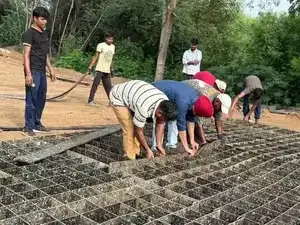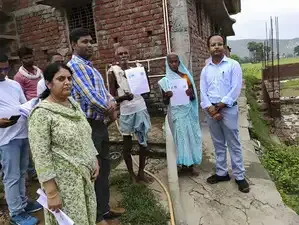In a new initiative to tackle end-of-life plastic waste, the Central Road Research Institute (CRRI) and Bharat Petroleum Corporation Limited (BPCL) have developed Geocells—three-dimensional, block-shaped modules made using waste plastic, reported TOI. These modules can be filled with soil or construction debris and used for building roads, particularly in challenging terrain.
The innovation, jointly patented by CSIR-CRRI and BPCL, is slated for field trials with the Military Engineering Services starting in August. The teams aim to showcase its application in high-stress, difficult-to-access regions.
Pilot demonstration on DND-Faridabad expressway
As part of the initial deployment, CRRI and BPCL used Geocells to pave a stretch near the DND-Faridabad-KMP Expressway. According to Ankita Behl, principal scientist at CSIR-CRRI, “CRRI and BPCL developed a plastic-based module or sheet and a technical textile called Geocell, using end-of-life and mixed waste plastics. Recycling such plastics is particularly challenging due to the wide variation in material quality.”
Behl added that the material was processed through mechanical recycling, producing modules with a thickness of 4–8 mm. Plant trials in collaboration with TATA Projects and a 160-metre road section, supported by the National Highways Authority of India, helped validate the concept.
Lab results show promising performance
CRRI stated that the Geocells were filled with non-plastic, granular base materials and tested for load-bearing strength. “During the laboratory test and plant trial, no signs of cracks... were detected during or after the test. The overall shape of the cells remained intact.”
The trial, involving 20–25 tonnes of waste plastic, is the first in the country to use technical textiles made entirely from end-of-life plastic. The method also addresses the issue of multi-layered plastics, which are currently not included in Indian Roads Congress (IRC) specifications.
CRRI said the technology could help improve plastic waste management and road durability.
(With inputs from TOI)
The innovation, jointly patented by CSIR-CRRI and BPCL, is slated for field trials with the Military Engineering Services starting in August. The teams aim to showcase its application in high-stress, difficult-to-access regions.
Pilot demonstration on DND-Faridabad expressway
As part of the initial deployment, CRRI and BPCL used Geocells to pave a stretch near the DND-Faridabad-KMP Expressway. According to Ankita Behl, principal scientist at CSIR-CRRI, “CRRI and BPCL developed a plastic-based module or sheet and a technical textile called Geocell, using end-of-life and mixed waste plastics. Recycling such plastics is particularly challenging due to the wide variation in material quality.”
Behl added that the material was processed through mechanical recycling, producing modules with a thickness of 4–8 mm. Plant trials in collaboration with TATA Projects and a 160-metre road section, supported by the National Highways Authority of India, helped validate the concept.
Lab results show promising performance
CRRI stated that the Geocells were filled with non-plastic, granular base materials and tested for load-bearing strength. “During the laboratory test and plant trial, no signs of cracks... were detected during or after the test. The overall shape of the cells remained intact.”
The trial, involving 20–25 tonnes of waste plastic, is the first in the country to use technical textiles made entirely from end-of-life plastic. The method also addresses the issue of multi-layered plastics, which are currently not included in Indian Roads Congress (IRC) specifications.
CRRI said the technology could help improve plastic waste management and road durability.
(With inputs from TOI)








